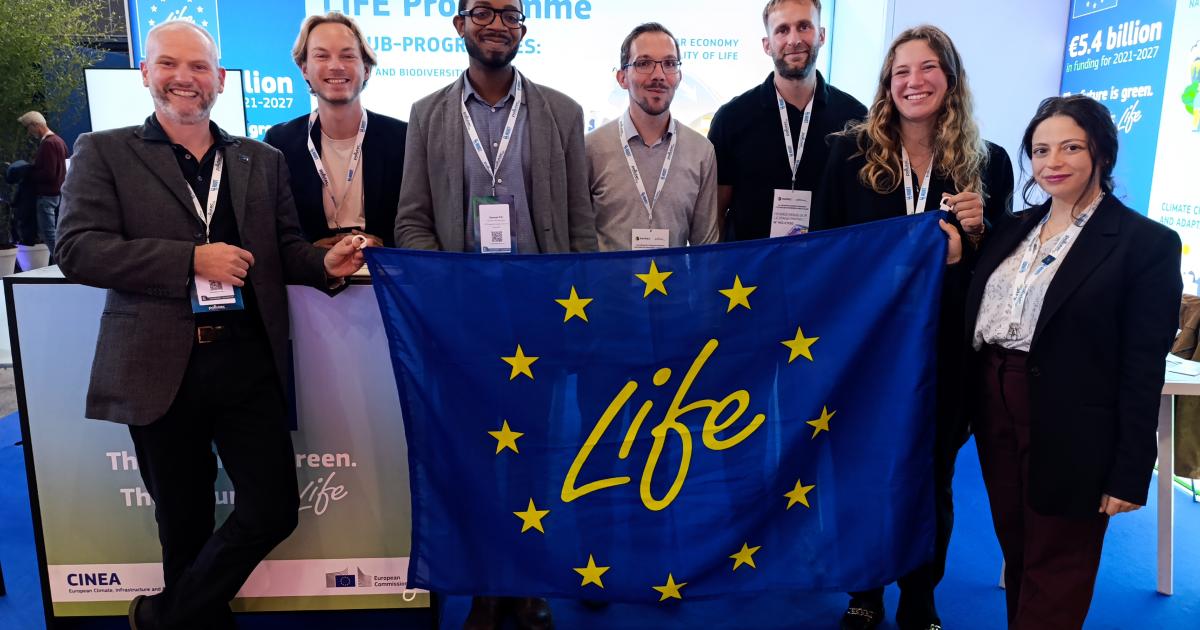Six French-led LIFE projects attended POLLUTEC 2025 in Lyon, France, to share their experiences across European industry sectors including waste, water and energy. The projects showcased sustainable solutions for helping to grow Europe’s green circular economy market and their work to create sustainable cities and regions in Europe and in Ukraine.
The LIFE Programme stand hosted lunchtime drop-in sessions featuring close-to-market projects, while two LIFE projects — LIFE ZEUS and LIFE VINOSHIELD — took part in a special Risk Forum presentation with a focus on tackling environmental and health risks organised by LIFE’s National Contact Point (NCP) in France Dalia Amara and Adélia Asselin.
The 5-year, €4 million LIFE ZEUS project demonstrates the environmental, technical and economic value of recycling water in the food and drinks industry. LIFE VINOSHIELD, a 4-year, €4.1 million project which runs until 2028 uses recycled plastic netting to protect European vineyards from the worst impacts of climate change.
LIFE ZEUS project director François Chaine explained how the latest combined ultra- and nano-filtration membrane technology is cheaper to install and operate while being more efficient and profitable than conventional water recycling. ‘Recycling the water used for processing in the agri-food industry is a no-brainer,’ he added. ‘It has a positive impact reducing energy consumption, decarbonising the industry and saving money — and it can be applied at factories all over the EU.’ Already, the LIFE ZEUS pilot at a fruit drinks factory has reduced water consumption by 60% whilst using far fewer chemicals — all at half the previous cost.
The session also featured LIFE VINOSHIELD, which is trialling specially designed nets made from recycled plastic at 6 wine producers across Spain, France and Italy to shield vines from climate-induced extreme weather conditions. Two types of net are being evaluated — one to protect against frost and hail, and a multifunctional net to guard against diseases, excess sunlight and heavy rainfall. The shade provided by the nets also helps reduce water stress.
‘Our nets protect the grapes from climate hazards and reduce vine damage from 30% to 5%,’ project coordinator Bruno Mougin told the audience. ‘We are currently testing them in 12 different sites in the 3 European countries which produce the most wine, and in the future our nets could be replicated all over Europe. We’re also working to reduce the environmental impact of our solutions by exploring alternatives made from compostable materials.’
LIFE projects working on sustainable cities and regions in Ukraine also attracted attention. In Chernihiv region, LIFE Panelka 2.0 is refurbishing a panelka — a notoriously energy-inefficient type of Soviet-era concrete-panel apartment block — to demonstrate the benefits of sustainable renovation over new construction. In the Kyiv region, LIFE D2R-GreenUA aims to remove, sort and reuse building debris for post-war reconstruction by establishing safety procedures for sorting and collecting materials locally and by ensuring quality standards for the secondary use of recycled construction materials
SECO2ND LIFE GIS — which deploys mobile recycled water treatment units in southern France to reduce freshwater consumption — and LIFE ReWa, which aims to replace climate-damaging greenhouse gases used in high-voltage electricity substations, also presented their work at the LIFE Programme stand.
The 6 projects — and hundreds of other LIFE projects — support key EU policies including the European Green Deal, the EU Circular Economy Action Plan and the EU Clean Industrial Deal.

